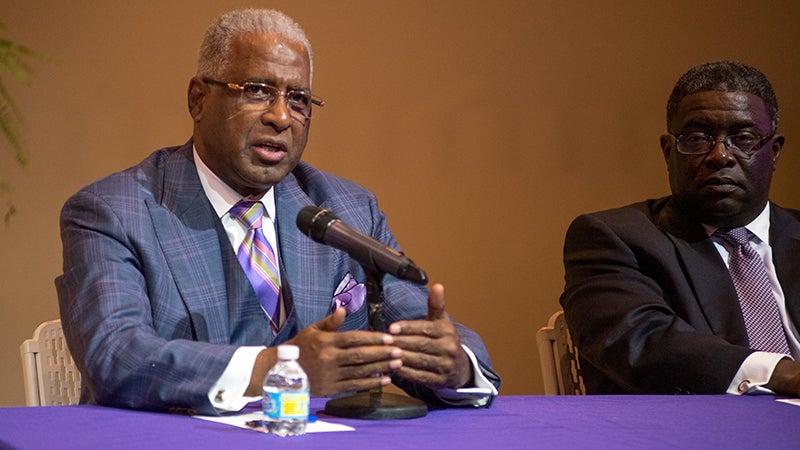UM hosts talk on race and law enforcement
Published 4:52 pm Thursday, October 13, 2016

- Birmingham Mayor William Bell, left, speaks to the crowd in LeBaron Recital Hall on the campus of the University of Montevallo during a conversation on race and law enforcement. (Reporter Photo/Keith McCoy)
By GRAHAM BROOKS / Staff Writer
MONTEVALLO–A capacity crowd filled LeBaron Recital Hall at the University of Montevallo on Tuesday, Oct. 11, to witness several local and state leaders discuss current race relations and how to improve those relationships moving forward.
The symposium titled, “Better Together: A conversation on race and law enforcement,” was held after numerous racial conflicts across the country this summer inspired UM President Dr. John W. Stewart III and UM trustees Brian Hamilton and LeRoy Nix to hold the symposium. These included the deaths of unarmed African American men Phliando Castile and Alton Sterling, as well as the controversial shooting in Dallas that killed five police officers.
The symposium featured five guest panelists that included Birmingham Mayor William Bell, Director of Minority Affairs for Gov. Robert Bentley’s Office Nichelle Nix, Reverend Arthur Price, Jr. of the 16th Street Baptist Church, Shelby County Sheriff John Samaniego and Montgomery Mayor Todd Strange.
Christopher Nanni, the president and CEO of Community Foundation of Greater Birmingham served as moderator.
The panel discussed several topics and even answered some audience questions during the approximately hour in a half symposium.
“One thing is that there needs to be trust between the law enforcement agencies and the citizens and that is paramount,” Samaniego said when asked what was his perspective on what is playing out in cities between police and minorities. “It’s the responsibility of the police agency to push that trust and make that available to the citizens through community policing, community outreach programs, to supporting partnerships.”
Bell said that the media will try to paint the picture that these incidents are happening everywhere.
“When you look at news outlets you make think that crime is running rampant and you may think that people are being killed everywhere and that’s simply not the case,” said Bell. “But it is the case that most of it is concentrated in certain areas. Most of it has root causes and some of those root causes are lack of education or poor education in certain communities.”
Another item discussed was the role that implicit bias plays in today’s society and each panelist agreed that although one might try to deny it, each individual has a tendency to use implicit bias in certain cases.
Samaniego said diversity training and numerous things are done at the Sheriff’s Office to eliminate any implicit bias an individual might have coming into training however, he cautioned that implicit bias can change from jurisdiction to jurisdiction.
When asked about the Black Lives Matter group, Price said the group plays an important role in society.
“Black Lives Matter is letting us see that everything still is not all and well in America, that there are still African American people who are subjected to bias,” said Price. “Not to say that all lives don’t matter or blue lives don’t matter, I have police officers who are friends and I worked in law enforcement for almost 15 years. What I think the Black Lives Matter movement is saying is that if you have 10 houses on the block, all those houses on the block matter but the one that is burning at that particular time matters the most.”
Near the end of the discussion, all the panelists agreed that symposium’s like this are one of the main ways to take a step in the right direction.
Before concluding the discussion, Nanni gave four pieces of advice that the audience could do once they left LeBaron Hall.
The four things were: Go outside of your comfort zone, enter into meaningful relationships, recognize privilege and go beyond tolerance.









